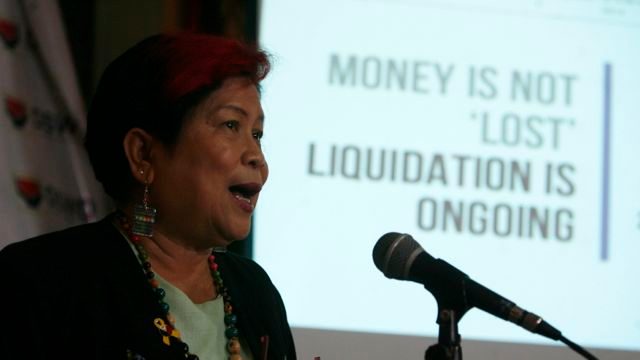SUMMARY
This is AI generated summarization, which may have errors. For context, always refer to the full article.

MANILA, Philippines – The Department of Social Welfare and Development (DSWD) said only P204 million ($4.6 million*) in conditional cash transfer (CCT) funds remain unliquidated.
In a press conference on Monday, September 15, Social Welfare Secretary Corazon Soliman debunked a Commission on Audit (COA) report that P5 billion ($112.9 million) in cash advances for the government’s flagship poverty alleviation program were unliquidated. (READ: Miriam to rise from sickbed to grill DSWD execs on CCT fund)
The Philippine Postal Corporation (PhlPost) had been tapped as a conduit for the distribution of the cash advances to families participating in the government’s Pantawid Pamilyang Pilipino Program (4Ps)
Earlier, Soliman said that only P1.6 billion ($36,097) – not P5 billion – remains unliquidated, and that the process is ongoing.
“From 2013, only P204 million remains to be liquidated,” she said.
The areas with unliquidated CCT are in Regions IX, X, XI, XII, Caraga and ARMM.
Soliman explained that the DSWD courses the distribution of cash grants to Landbank, with which it has a Memorandum of Agreement (MOA).
In turn, Landbank had contracted PhlPost to deliver the cash grants to beneficiaries living in remote areas.
“PhlPost has an MOA with Landbank, not with DSWD. Landbank reports to us on the process of liquidation,” Soliman said.
Beginning June 2014, Landbank terminated its contract with PhlPost due to delays in liquidation, Soliman added.
The social welfare secretary also touted the success of the government’s anti-poverty program, citing the results of a second impact evaluation.
Responding to criticism that the CCT was a dole-out program, Soliman said the evaluation has shown that 16.9% of the beneficiaries are employed or looking for additional work to supplement their income.
“It’s often been said that the program creates a culture of laziness and dependency among our partner beneficiaries. But the impact evaluation has shown that those in the program do not entirely rely on it. They feel confident and are empowered to look for additional work,” Soliman said.
The social welfare secretary added that through the program, more children from poor families have access to basic health and education services. – Rappler.com
$1 = P44.3248
Add a comment
How does this make you feel?
There are no comments yet. Add your comment to start the conversation.